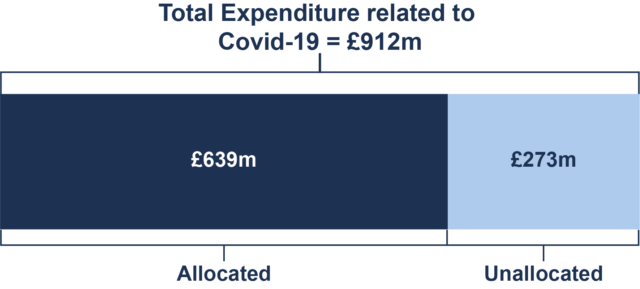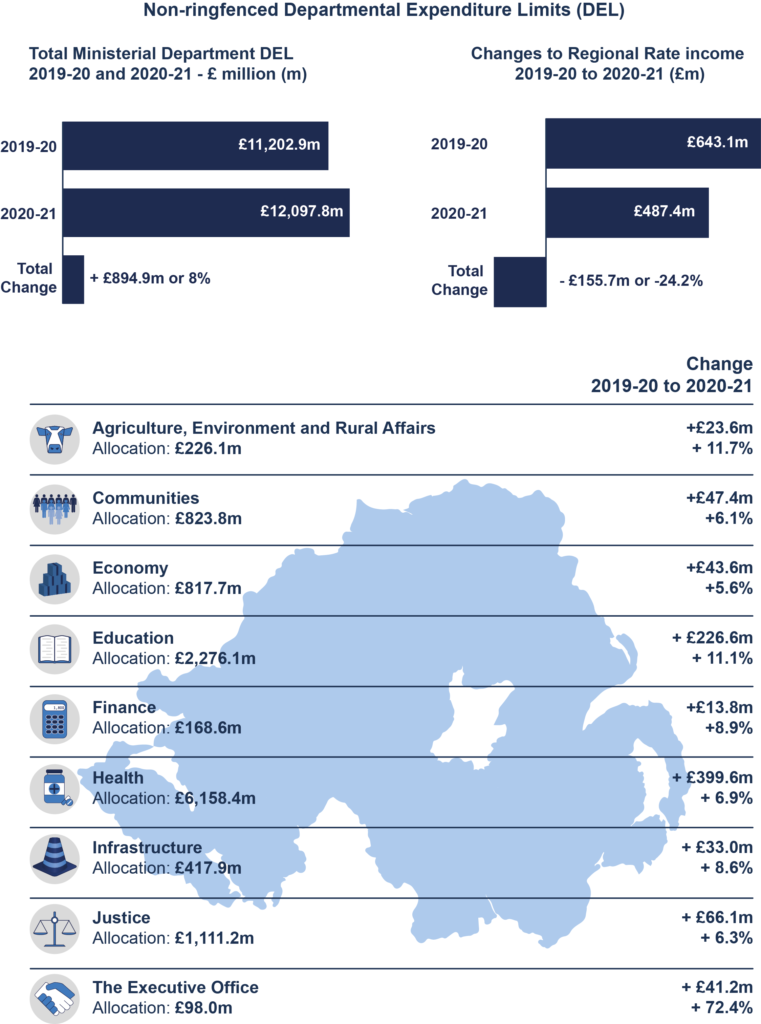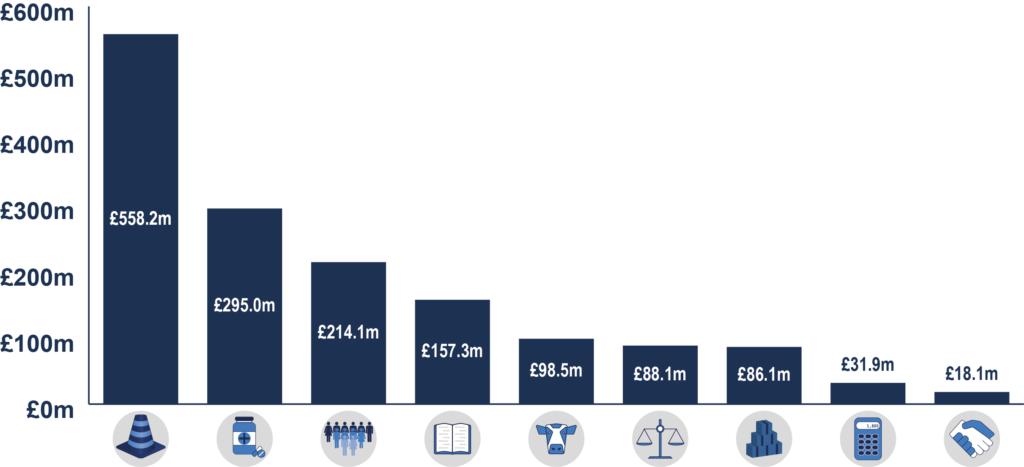
In his statement on 31 March, the Minister of Finance noted that the world has changed dramatically since his 16 March statement on the Northern Ireland (NI) Executive Budget 2020-21. There is an ongoing public health crisis due to COVID-19, which increasingly is compounded by an economic crisis; as the Nevin Institute recently noted, ‘recession is inevitable’.
This blog highlights the Executive’s initial 2020-21 budgetary response to a situation unfolding hourly, with grave uncertainties. Further announcements are expected in the coming weeks, as the Finance Minister advised in his statement. Before looking at the Executive’s expenditure allocations to departments, this article first takes stock of the following: the Executive’s decision to exercise its devolved rating power in 2020-21, using a number of measures explained below; and, COVID-19-specific funding provided by the UK Government.
Executive response: Rates
The aim of the Executive’s rates response is to support individual NI businesses and households in these extreme times, as they face increasing financial hardship. The response ultimately seeks to support the NI economy now and after COVID-19, and includes three measures:
- One of the headline measures in the Executive’s response is a cut in business rates of what effectively is an ‘18% reduction on the 2019-20 figure‘. In addition, there is a ‘rates holiday’, meaning businesses will see an additional 25% discount to their annual rates bill. The outworking of these measures will be a reduction in NI Regional Rates income from £643.1 million in 2019-20, to £487.4 million in 2020-21. Specifically, the Minister explained that this ‘rates holiday’ would result in £100 million revenue lost to NI public finances. This is why £100 million of COVID-19 funding is allocated to this purpose (see below).
- The Minister also announced an extension of the Small Business Rates Relief scheme (SBRR). In 2014, an evaluation of that scheme recommended its phasing out ‘as economic conditions improve‘. In the intervening period, such conditions had improved somewhat, but now have declined dramatically. In future, post COVID-19, the Executive may reconsider its view of this scheme in the longer-term.
- In relation to households, the Minister announced that domestic rates would be frozen for 2020-21.
Executive response: COVID-19-specific funding
In his statement, the Finance Minister stated:
On the distribution of COVID-19 funding, we have allocated £639 million out of the £912 million. We have asked Departments for bids on COVID-19-specific responses, and we look forward to getting those. Whether it be through statements to the Assembly, depending on how the new Ad Hoc Committee works, or written statements, we will ensure that Members get sight of that so that they can scrutinise and ask questions in the appropriate manner.
Following the Finance Minister’s statement, the First Minister spoke at the daily COVID-19 briefing, explaining that COVID-19-specific money would be “allocated in a separate process”. Further detail on those allocations is awaited. For now, Figure 1 below shows a breakdown of currently allocated and non-allocated COVID-19-specific funding:

In the days and weeks to come, Assembly committees and the NI public will be keeping a close eye on both the use of allocated COVID-19-specific funding to date, and the future distribution of unallocated funding (see Assembly scrutiny below).
Executive response: Departmental Expenditure Limit (DEL) allocations
Aside from the emergency COVID-19 funding from the UK Government, the Executive also has had to allocate funding to departments, as it would in any budget year. This is to ensure ongoing delivery of public services; and those allocations are shown in Figure 2 below:

Figure 2, using data provided in the Minister’s statement, shows that the largest percentage increase is for the Executive Office – over 70% – making it particularly notable. In his recent statement, the Finance Minister explained:
The additional spend in relation to the Executive Office that he mentioned is primarily due to the inclusion of £37.5 million for historical institutional abuse payments in 2020-21.
Figure 2 also shows allocation increases across all the departments when compared to their baseline positions. In time, more will need to be known about how those baselines were calculated. More also will need to be known on how departmental ministers exercise their greater flexibility and move monies between spending areas. Such flexibility follows on from the Executive’s agreement to give departments greater flexibility, so that they could be reactive and reprioritise spending in the current context. The Minister justified this flexibility in his statement, saying:
…it is quite clear that some Departments will not be able to spend money because certain functions are not happening and they will not spend money as they had planned.
Also, more will need to be learned about what Figure 2 does not include. It does not reflect both:
- COVID-19-specific funding that still is to be allocated; and,
- The following amounts that still are to be allocated, i.e:
- A further £278.6 million to be allocated to the Department for Agriculture, Environment and Rural Affairs for Farm Support Payments, which replace the EU Common Agriculture Policy payments;
- £70 million held centrally in reserve by the Department of Finance, and to be allocated during the year as needs arise; and,
- £195 million of Financial Transactions Capital.
Executive response: Departmental Capital DEL expenditure allocations
In addition to the Resource DEL allocations to pay for day-to-day services, departments have Capital DEL allocations, as shown in Figure 3 below:

In the short-term, it is likely that the focus of departments will be away from capital spending, and almost entirely on spending aimed to mitigate issues arising from the ongoing public health crisis, as well as spending to simply continue public service delivery. It seems reasonable to speculate that that will place pressure on departments’ ability to spend their capital budgets in 2020-21 – this financial year, which started today.
It is late for departments to have learned this only now, but it apparently was unavoidable given a number of factors, including: the recent return of fully functioning devolved government in January 2020 , after a three-year hiatus; late Barnett consequentials from the UK Government for 2019-20; a much later than usual UK Chancellor Budget, which provided 2020-21 NI figures for the Executive on 11 March 2020; and, COVID-19.
As a result, challenges arise for departments from the start of the financial year in terms of capital spending. The planning and approvals process for capital projects is usually lengthy in the best of circumstances. Hence, delayed notice of capital allocations is compounded by the restrictions imposed due to the current pandemic.
Given the parameters of the NI Public Finance Framework, it may be sensible for the Executive to seek additional flexibility from Treasury, to carry over spending in this area into the following year, 2021-22. This foresight could help to avoid rushed, and potentially sub-optimal spending at the end of this financial year. (For a discussion of year-end expenditure, see section 1 of Year-end surges in Northern Ireland departmental expenditure). On the other hand, investment spending will probably be crucial in helping industry to recover from the current economic pain.
In these challenging times, there is considerable uncertainty. It seems one of the few certainties is that further economic pain will be experienced in NI, and indeed in countries throughout the entire world economy.
Assembly scrutiny
In the near future, more information will become available on:
- Funding not yet allocated by the Executive – e.g. COVID-19-specific money, Farm Support Payments, Financial Transactions Capital;
- The departmental baselines highlighted in Figure 2 above – e.g. how they were calculated;
- Departmental use of additional flexibility for reprioritisation of expenditure – e.g. how they move money between spending areas as referenced by the Minister;
- Departmental use of capital expenditure highlighted in Figure 3 – e.g. how they progress or do not progress projects.
All the above information will help to inform the forthcoming Assembly budget scrutiny process, which is most intensely undertaken by individual statutory committees. Indeed, the Finance Minister recognised the importance of Assembly committee scrutiny, when he undertook in his recent statement to write to Committee Chairpersons:
I have undertaken to the Chair of the Finance Committee that I will write to Committee Chairs so that they have a clear understanding, when they scrutinise spending by the Department that they hold to account, of the arrangements.
Future blog articles and other publications produced by the Research and Information Service (RaISe) will seek to inform that scrutiny.

